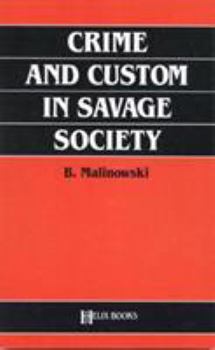Crime and Custom in Savage Society
Select Format
Select Condition 
Book Overview
Bronislaw Malinowski achieved international recognition as the founder of "functionalism" in social anthropology, based on his studies of Melanesian society on the Trobriand Islands off New Guinea. His Crime and Custom in Savage Society is now one of the classic works of modern anthropology. In his book, Malinowski describes and analyzes the ways in which Trobriand Islanders structure and maintain the social and economic order of their tribe. This is essential reading for anyone interested in anthropology.
Format:Paperback
Language:English
ISBN:0822602105
ISBN13:9780822602101
Release Date:February 1989
Publisher:Rowman & Littlefield Publishers
Length:132 Pages
Weight:0.76 lbs.
Dimensions:0.5" x 7.0" x 8.0"
Customer Reviews
1 rating
How does "law" work among the natives in Papua New Guinea?
Published by Thriftbooks.com User , 20 years ago
This is a clever book. I am not a professional anthropologist, but I have still profited from reading it. A good piece of science with good observations and intelligent conclusions ages well. Written in the 1920s and based on observations Malinowski has made during WW I in Papua New Guinea, "Crime and Custom in Savage Society" deals with "law" in traditional society. Malinowski is fighting the view that prevailed among anthropologists at that time, which was that people in traditional societies follow the clan rules in a quasi instinctive manner, unable to diverge from the rules. He disagrees and makes his point on the basis of a number of observations that he made while on the Trobidand islands. The islanders did not at all slavishly adhere to the rules of tribal culture. Instead, sometimes they strove to circumvent the laws just as western businessmen sometimes try to evade tax law. The rules are what differs between their societies and ours, and the amount of codification of these rules, but not basic human psychology towards "the law". A multitude of human behaviors in the face of rules and regulations of different types exists in Europe and in Papua New Guinea. I find the conclusions both highly interesting from a cultural point of view and also anti-racist: The natives on the coral islands on the other side of the world show complex human social strategies if confronted with rules and regulations just as we do. Malinowski is considered one of the the first proponents of modern, scientific anthropology. I can definitely see why - he is a sharp observer and puts things intelligently in context. These skills will never go out of fashion in science.





